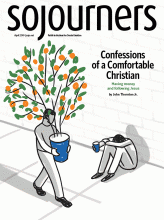UNITED METHODIST BISHOP Cynthia Moore-Koikoi has fond memories of growing up in the church. It helped form and develop her as a leader, she said. But her involvement with church administration and leadership came with a price, as she described in a panel at the Religion News Association conference in 2018. As a youth delegate to her annual convention, Moore-Koikoi recalled that whenever she walked by a certain group of clergy, “they were going to make comments about my physical appearance ... I learned how to turn my face quickly when that ‘holy kiss’ was given so that it would land on my cheek not on my lips. It was like I was walking a gauntlet at times.”
In 2016, Moore-Koikoi was consecrated as a bishop and called to serve United Methodists in western Pennsylvania. Certainly, she thought, serving in such a high church position and marriage would protect her from sexual comments and predation. But, says Moore-Koikoi, “no level of power or authority in the church can insulate persons from sexual harassment.” Sojourners’ senior associate editor Rose Marie Berger interviewed Moore-Koikoi by phone in December 2018.
Sojourners: In 2016 you were elected bishop. Have you experienced any sexualized pressure, harassment, or assault since your ordination as a bishop?
Bishop Cynthia Moore-Koikoi: Yes. There was an incident that happened not long after I was ordained a bishop that I characterize as sexual harassment. Unfortunately, it happened at one of the earliest meetings that I went to as a bishop with the Council of Bishops. An individual there made some inappropriate comments about me, about my physical appearance and about his desires. It was a very uncomfortable situation, [my] being a new bishop, not knowing how bishops conduct themselves at those kinds of things.
Read the Full Article

